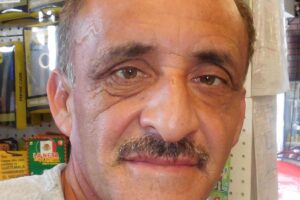Mexican immigrant finds success in Decatur

By Wes Tomlinson | Living 50 Plus
When talking about work ethic and the immigrant’s journey to obtain the American dream, Hispanic residents near Central Parkway and 14th Street Southwest smile when they talk about the success of Decatur resident Alfredo Chavez, a man respectfully referred to as El Jefe (The Boss).
Chavez, who turns 57 this month, owns five businesses in Southwest Decatur and can be seen any day of the week hard at work at either his grocery store, La Estrella Food and Fish Market; his thrift store, El Pulgon Mexicano; his flea market or his two tire shops that eldest son Alfredo Jr. manages.
Although his 40-year journey in the United States has proved successful, he did not grow up with the opportunities his children now have.
Chavez was born and raised in Mexico City along with his four sisters and 12 brothers.
“I came from a family who was real poor,” Chavez said. “Starting when I was 6, I would help my brothers sell newspapers in the morning before I would go to school.”
His father worked as a street sweeper for the city while his mother stayed home to take care of her children. Chavez’s ever-present smile grows even wider when he reminisces about how his mother did the best she could with the resources she had.
“Although we were poor and had little food, we were very happy and loved,” Chavez said. “We ate the same things every day: frijoles (refried beans), papas (potatoes) and tortillas. We didn’t care because we were happy we had food.”
Chavez said he felt the United States offered better financial and educational opportunities, and that led him to decide at age 16 to emigrate. The two oldest Chavez brothers had already emigrated and worked as field hands in Gainesville, Georgia, picking tomatoes and cucumbers and they were able to secure a job for Alfredo.
“In Mexico, if you don’t have a good education, you’re always going to be poor,” Chavez said. “I wanted to get out of that situation and try to find a good life.”
Chavez spent 10 years working as a field hand in both Georgia and Florida, an occupation that earned him his citizenship. Congress passed the Immigration Reform and Control Act in 1986, which provided amnesty for certain long-term residents and a path to obtain legal permanent status, as well as a special expedited process for farmworkers. Under this act, 2.7 million long-term immigrants received legal permanent status.
“You kept working in the fields, you got your papers,” Chavez said.
After he left the farms, Chavez began working in a chicken plant in Gainesville where he eventually met his wife with whom he has three children: Alfredo Jr., 25, Joseline, 23, and Saul, 21. Saul is a Marine stationed in Los Angeles and Joseline is a veterinarian assistant, currently in school pursuing her veterinarian degree.
Chavez said it was important for him to give back to his community and he has been doing just that in the last 10 years by selling some of his produce to El Maderense, a Mexican-owned supermarket on Austinville Road Southwest.
“He sells us corn, bread, tomatoes and jalapenos,” said Nidia Fregoso, a clerk at El Maderense. “He sells it to us pretty cheap and it’s always fresh product.”
Chavez also has a money transfer booth in La Estrella where immigrants can wire money to their families back home.
Fregoso said many in Decatur’s Hispanic community were concerned about the passage of House Bill 56 in 2011, or the Beason-Hammon Alabama Taxpayer and Citizen Protection Act that was co-sponsored by former Rep. Micky Hammon, R-Decatur, who later served a 90-day prison sentence after pleading guilty to mail fraud for misuse of campaign funds. Portions of the law were blocked by an eventual court settlement, but other parts prevented illegal immigrants from attending state-funded colleges and universities and prevented them from accessing certain local and state benefits.
Fregoso said Chavez acted as a liaison between the Hispanic community and the Decatur Police Department after the law’s passage, hosting meetings with them every month. The law allowed law enforcement officers to inquire about the immigration status of people only if they were lawfully stopped and there was reason to suspect they were undocumented.
“Some Hispanic people here were scared they were going to get deported,” Fregoso said. “Chavez held meetings with the police and talked to them about that. He’s a real community leader.”
Chavez said the best years of his life were bonding with his children when they were young and taking them to amusement parks like Disneyland. All three of his children graduated from Austin High School.
“Raising them in America was very important to me,” Chavez said. “Just being able to offer them things that I didn’t get to have as a kid.”
